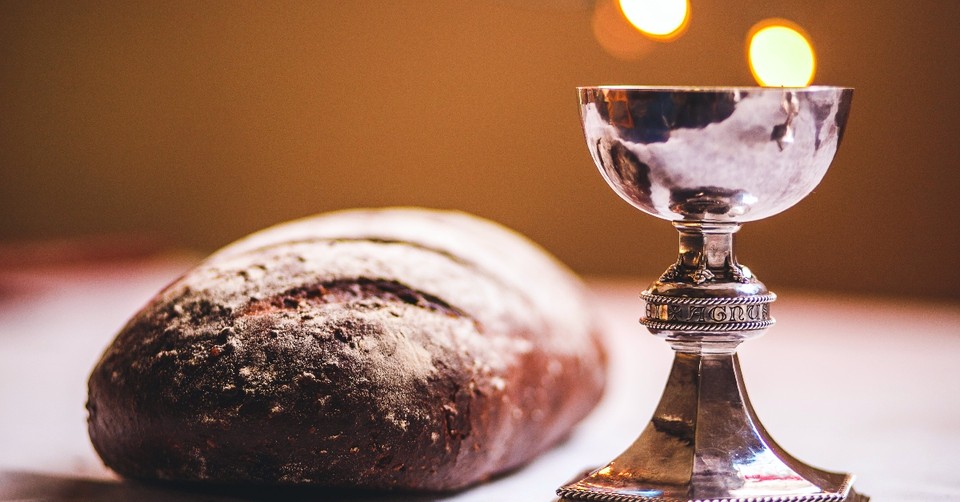Who Can Take Communion According to the Bible?

It's the crux of Christianity: to remember and give thanks through what we now call communion. Why? Because remembering what Christ did at the Last Supper and then on the cross is at the core of our faith. Because breaking bread—His body, and drinking wine—His blood, causes us to re-remember with gratitude what Jesus did for us. It causes us to re-remember how He gave His body and His life for ours. It reminds us to re-believe how much He loved and still loves. It causes us to pause and re-remember how His love holds us together in this hustle-driven and broken world. If communion is so important—then who can take communion according to the Bible?
"For as often as you eat this bread and drink the cup, you proclaim the Lord's death until he comes." - 1 Corinthians 11:26
What Is Communion and What Does Communion Symbolize?
Before we define communion, we need to rewind history to the moment when God freed the Israelites. Four hundred years before the Passover, God saved the Jewish people from a deadly famine by bringing them out of Egypt. This brings us to the story of Joseph. Out of jealousy and spite, his brothers sold him into slavery. He eventually worked his way up to being second in command in all of Egypt. When the nation faced starvation, Joseph helped save them through divine planning. However, after Joseph passed away, the Jewish people were enslaved. They lived in bondage until God raised up another great man, Moses. Through his leadership, Moses freed the Israelites four hundred years later. That day became Passover. Jewish tradition says, "If God had not delivered us," the Passover Haggadah (HAH-gah-dah) reads and means, "we would still be slaves."
In the book of Exodus, the origin of Passover begins after God promised to redeem His people (Exodus 6:6). God commanded Moses to tell Pharaoh, the Egyptian king, to "let my people go (Exodus 8:1). But as the story goes, God sent several plagues to Pharoah before he finally relented. The first Passover began the night of the tenth, final, and worst plague when God sent death to all of the firstborn of Egypt. During this historic and fateful night, God instructed the Israelites to sacrifice a spotless lamb and mark their doorposts and beams with its blood (Exodus 12:21–22). Then when the Lord passed through the nation, He would "pass over" the households marked with the lamb's innocent blood. God also instructed them to prepare a meal of fire-roasted lamb, bitter herbs, and unleavened bread (Exodus 12:8). Those who obeyed the Lord were spared as the Angel of Death "passed over" the Israelites. They had been redeemed in a very real way from the sacrifice from the blood of the lamb. This tradition continued for hundreds of years and is still celebrated to this day. Jews all over the world celebrate Passover in obedience to God. So what does this have to do with communion? Let's travel into the New Testament towards the end of Jesus' final hours on this earth.
John 6:53-58 says, "So Jesus said to them, "Truly, truly, I say to you, unless you eat the flesh of the Son of Man and drink his blood, you have no life in you. Whoever feeds on my flesh and drinks my blood has eternal life, and I will raise him up on the last day. For my flesh is true food, and my blood is true drink. Whoever feeds on my flesh and drinks my blood abides in me, and I in him. As the living Father sent me, and I live because of the Father, so whoever feeds on me, he also will live because of me. This is the bread that came down from heaven, not like the bread the fathers ate and died. Whoever feeds on this bread will live forever." Jesus became our innocent lamb when He shed His blood on the cross. Prior to His crucifixion at The Last Supper, Jesus passed around bread and a cup of wine and said, "'This is my body given for you; do this in remembrance of me.' In the same way, after the supper he took the cup, saying, 'This cup is the new covenant in my blood, which is poured out for you'" (Luke 22:19-21). And they went out into the night to the Mount of Olives where Jesus prayed. It was there that, as predicted, Jesus was betrayed by Judas. The following day He was crucified. The elements of the bread and wine were a representation of what He was about to do for the world on the cross as He told His disciples He would break His body and spill His blood for the sake of the world (1 Corinthians 5:7; Matthew 5:17; Luke 22:7-8; Revelations 5:12).
Today when we gather as a church body, communion is held to remind us why Jesus, the Son of God, came to earth as a man. He came to redeem a broken world filled with broken people to save us from our sins. By spiritually taking His blood represented in juice cups and eating bread that represented His body, we trust Christ to save us from spiritual death. It is the blood of the lamb that saves us from being separated from God (see John 1:29 and Revelation 5:9–10).
Who Can Take Communion According to the Bible?
Some churches only offer communion to church members. However, other churches offer it to anyone because they believe that we are all one church regardless of church membership. Most pastors offer a word of caution: we are to examine our hearts and ask the Holy Spirit to reveal any areas of unresolved sin to prevent us from "partaking in communion in an unworthy manner." The apostle Paul wrote in 1 Corinthians 11:23-29: "Therefore, whoever eats the bread or drinks the cup of the Lord in an unworthy manner will be guilty of sinning against the body and blood of the Lord. A man ought to examine himself before he eats of the bread and drinks of the cup. For anyone who eats and drinks without recognizing the body of the Lord eats and drinks judgment on himself" (1 Corinthians 11:27-29).
In keeping with Paul's instructions, we as the church body need to examine our hearts before we take communion. We need to re-remember what Christ endured leading up the cross as He was unfairly condemned, whipped, abused, and beaten for our sins. We need to re-remember what it was like to Jesus as He willingly dragged Himself onto the cross to die in one of the most horrific ways possible—He took our place on the cross. We need to re-remember there His body was so severely tortured that it was hardly recognizable, and He did it for us (Psalm 22:12-17; Isaiah 53:4-7).
When Christ took His place as the innocent lamb, the Old Covenant established for atoning sins (spotless lambs, calves, etc.) was replaced with the New Covenant on the cross. When He said, "Do this in remembrance of me," He indicated this was a ceremony that was to be continued for all future generations. The Passover, which required the death of a lamb to take away the sin of the world, was fulfilled when Jesus became the lamb (Hebrews 8:8-13).
Why Are There Restrictions on Who Can Take Communion?
Taking communion is a beautiful, holy, and sacred reminder of what Jesus did for the sake of the world. The word communion means we are coming together united as a church body "living as Christ has united or enjoined us." Those who should not take communion do not believe in Christ, and those who have professed faith in Jesus but have unresolved sin. To take part in communion as an unbeliever or as a person living in sin is hypocrisy. This means if we have sins we have not dealt with, we need to hand them over to God. As Paul says, we are in danger of judgment by not doing so (1 Corinthians 11:28; Romans 6:3-5).
The Bible reminds us we are free to take communion in humility, as we are born again and living in obedience to God with no unresolved sins. And when we come to the Lord's Table, may we do so in reverence as we cherish just how far God went to save us through His mighty act of love, sovereignty, and grace through Jesus!
Photo credit: ©Unsplash/jhc

Originally published July 30, 2021.




